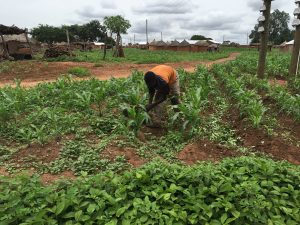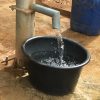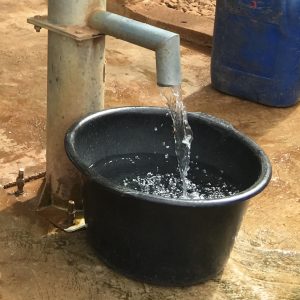The December 2015 United Nations Climate Change Conference was a landmark because countries such as the US, China, and India finally joined most of the rest of the world in an action plan to reduce carbon emissions and global warming. In addition, the Green Climate Fund was established to assist developing countries to adapt to the effects of climate change and to mitigate or reduce greenhouse gas production.
A second highlight of the year occurred when Pope Francis issued his encyclical On Care for Our Common Home (Laudato Si’). These two events of Fall 2015 had a significant impact on the world and our consciousness of climate change and commitment to systemic and personal change.

They formed the backdrop for the 11 faculty on our trip to northern Ghana with CRS. We focused on WASH – water, sanitation, and hygiene in northern Ghana – and CRS’s partnership with the local governments and other parties to improve water-related issues in these poor rural communities.
As we travelled northward in Ghana, individuals spoke to us about the effects of climate change and issues the communities need to address to increase their resilience in the face of changing rain patterns, the impact on crops, and water availability. A recent CRS article summarizes what Ghana is facing: “Currently, Ghana is seeing increasing temperatures, declining and variable rainfall totals, rising sea levels and more extreme weather patterns.” As we travelled to various communities, we saw the problems communities faced and learned of efforts to combat climate change. The quality of the land, to begin with, shows little apparent ability to retain water. This picture shows what the land looks like.
Dr. James Montgomery, associate professor in the Department of Environmental Science and Studies at DePaul University and a member of our trip, reflected on the effects of climate change on the Ghanaian people and how precious water and land are to them.
Montgomery explained how important the quality of the soil is for poor rural areas that struggle to produce sufficient food amid a changing climate. He stressed the importance of building up soil quality: “Soil security provides economic security, promotes public health, and provides climate change adaptability and resilience for a fraction of the cost of other types of initiatives.” He observed how little organic matter was present in the soil. More organic matter results in an increase in the storage of water in the soil. “We’re talking about the moisture available in the soil to grow those crops. Composting will build up the organic matter content, not only to provide the nitrogen and carbon and phosphorus but to store the moisture the plants need to grow.”
Ghanaians in these poor communities are doing their part to face climate change. Other blog entries on this site document how the communities we visited are drilling wells to obtain water. We saw how the people were collecting rain water and building eco-friendly latrines. We sat with community educators who explained how the children were learning how to use new hygiene practices. And we witnessed how these communities were increasing their economic capacity through savings and internal lending groups. All these are positive actions these people are taking.
But the global forces of climate change are beyond their control. Pope Francis calls our attention to how climate change is affecting the availability of water in areas such as Ghana: “Water poverty especially affects Africa where large sectors of the population have no access to safe drinking water or experience droughts which impede agricultural production” (Chapter 1, para. 28). When water availability is diminished, poor people who depend on agriculture are impacted most directly.
Pope Francis challenges the global community to a more forceful response to climate change and how we are affecting “our common home” and people such as those we met in Ghana.
Vanessa Tobin, CRS senior technical adviser for water, explains some systemic options the global community must take to meet the challenges:
“The major challenge in water governance is to align water use with demand at levels that protect the environment and to support and enforce effective legislation. People, who should pay for water, pay very little. Yet, the poorest in developing countries can pay up to 40% of their income for this basic necessity. Groundwater extraction must be regulated, and polluters should pay.”
As each of us went home, we reflected on how our teaching, our research, our advocacy, and our personal lives must change as a result of what we saw and learned in Ghana. I, for one, returned to Pope Francis’s encyclical to think about the key concepts of the common good, our one human family, and our purpose on earth.
“What is the purpose of our life in this world? Why are we here? What is the goal of our work and all our efforts? What need does the earth have of us? It is no longer enough, then, simply to state that we should be concerned for future generations. We need to see that what is at stake is our own dignity. Leaving an inhabitable planet to future generations is, first and foremost, up to us. The issue is one which dramatically affects us, for it has to do with the ultimate meaning of our earthly sojourn.” (Ch. 4, para. 160)


